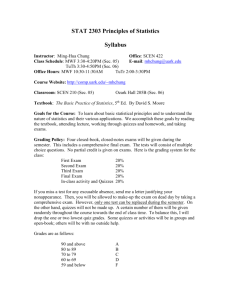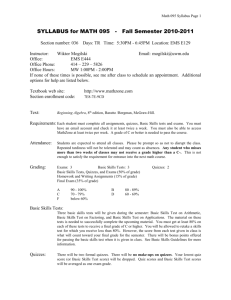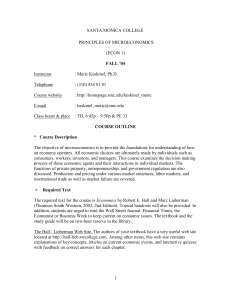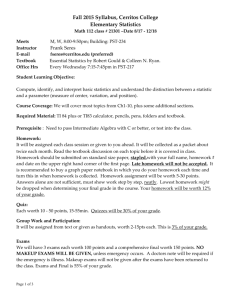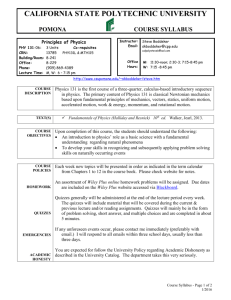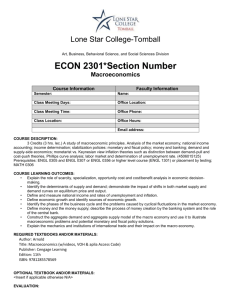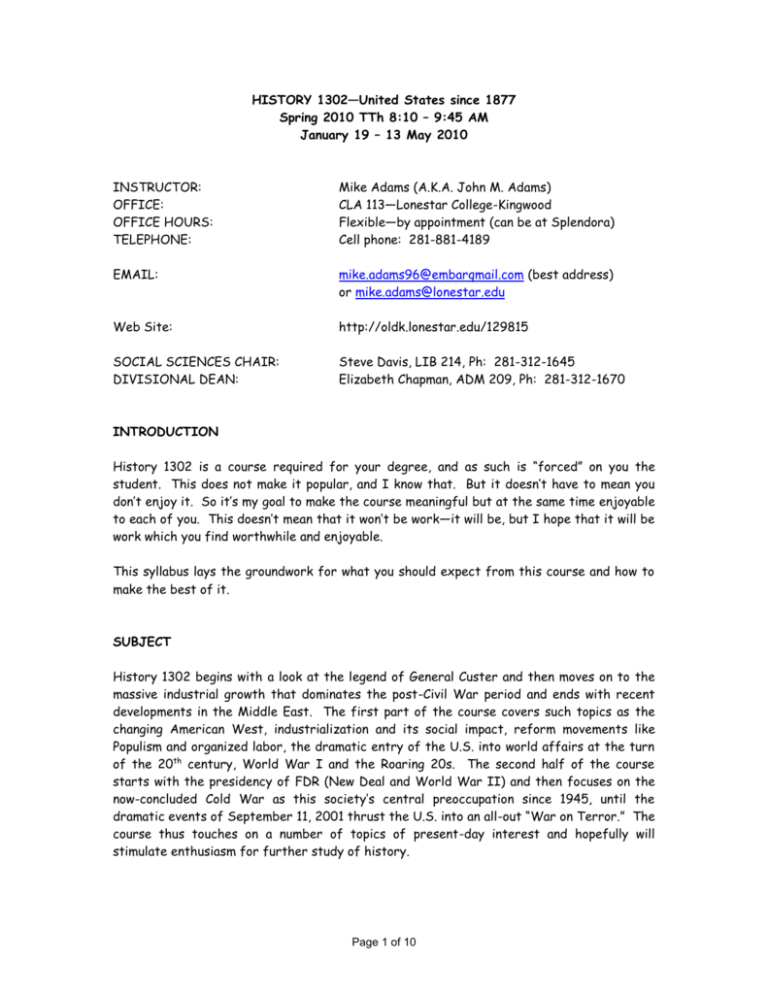
HISTORY 1302—United States since 1877
Spring 2010 TTh 8:10 – 9:45 AM
January 19 – 13 May 2010
INSTRUCTOR:
OFFICE:
OFFICE HOURS:
TELEPHONE:
Mike Adams (A.K.A. John M. Adams)
CLA 113—Lonestar College-Kingwood
Flexible—by appointment (can be at Splendora)
Cell phone: 281-881-4189
EMAIL:
mike.adams96@embarqmail.com (best address)
or mike.adams@lonestar.edu
Web Site:
http://oldk.lonestar.edu/129815
SOCIAL SCIENCES CHAIR:
DIVISIONAL DEAN:
Steve Davis, LIB 214, Ph: 281-312-1645
Elizabeth Chapman, ADM 209, Ph: 281-312-1670
INTRODUCTION
History 1302 is a course required for your degree, and as such is “forced” on you the
student. This does not make it popular, and I know that. But it doesn’t have to mean you
don’t enjoy it. So it’s my goal to make the course meaningful but at the same time enjoyable
to each of you. This doesn’t mean that it won’t be work—it will be, but I hope that it will be
work which you find worthwhile and enjoyable.
This syllabus lays the groundwork for what you should expect from this course and how to
make the best of it.
SUBJECT
History 1302 begins with a look at the legend of General Custer and then moves on to the
massive industrial growth that dominates the post-Civil War period and ends with recent
developments in the Middle East. The first part of the course covers such topics as the
changing American West, industrialization and its social impact, reform movements like
Populism and organized labor, the dramatic entry of the U.S. into world affairs at the turn
of the 20th century, World War I and the Roaring 20s. The second half of the course
starts with the presidency of FDR (New Deal and World War II) and then focuses on the
now-concluded Cold War as this society’s central preoccupation since 1945, until the
dramatic events of September 11, 2001 thrust the U.S. into an all-out “War on Terror.” The
course thus touches on a number of topics of present-day interest and hopefully will
stimulate enthusiasm for further study of history.
Page 1 of 10
Course Learning Objectives (Minimum):
Trace the rise of American power in the world of the late nineteenth century. Note
especially, the factors that make this growth possible, and assess its social,
economic, and political consequences on American life.
Ascertain the roots and manifestation of Wilsonian moralism, identify the causes of
American entry into World War I and discuss the role played by the US in ending
the war.
Analyze the development of American culture in the two decades between World
War I & II, noting in particular the causes and consequences of the Great
Depression and the reaction to it by Franklin Roosevelt's administration.
Explain the reasons for the outbreak of World War II in Europe in 1939 and
America's entry in 1941. Trace the major events of the war, and explain America's
contribution to the war effort at home and abroad.
Trace the development of America's Cold War with the Soviet Union (including our
involvement in Vietnam), and assess its impact on the social, economic, and political
character of the nation.
Analyze the major trends and developments in America's domestic legislation in the
post-WW II era, and assess their impact on American culture.
Page 2 of 10
REQUIRED READINGS (all available in Lonestar College-Kingwood book store)
George B. Tindall & David E. Shi, America, A Narrative History, seventh edition, Vol.
Two, 2007, published by W.W. Norton & Co., Inc. This text will be used
extensively throughout the semester.
ISBN 13: 978-0-393-92736-8
J. William T. Youngs, Eleanor Roosevelt, third edition, 2006, published by Pearson
Longman. This book studies the fascinating life of one of America’s great
ladies, from a youth orphaned by loss of both parents at a very early age,
through her active service as a unique First Lady and later representative to
the fledgling United Nations.
ISBN: 0-321-34232-1
John Howard Griffin, Black Like Me, 1960, published by Signet. Griffin, a white
man, darkened his skin in order to see what life was like in the deep south
for a black man. Only the color of his skin was changed, not his identity or
accent. He would tell anyone who wanted to know why he was doing this.
This gives profound insight into the black experience before the Civil Rights
movement.
ISBN: 0-451-19203-6
Elias Chacour, Blood Brothers, expanded edition 2003, published by Chosen Books.
Elias Chacour is a Palestinian Christian who spent his boyhood during the
period when Israel was being formed after World War II. His family lost
everything they owned when their village was taken over by the Zionists
(Israeli zealots), but he never lost faith that kindness, charity and hard
work would in the end bring peace and dignity to his people of Galilee.
ISBN: 0-8007-9321-8
Page 3 of 10
ATTENDANCE/MAKE-UP REQUIREMENTS:
Class meetings will be devoted to lectures, discussions and to a lesser extent, videos.
Regular attendance is required. Each student will be managing his/her own attendance and
will receive a grade for it. It will be worth 5% of your final grade. Each absence results in
a reduction of the final attendance average. Only severe medical problems or other
emergencies are grounds for missing class, and you will have to supply appropriate
documentation on the day you return to class for each day missed in order to avoid a
reduction.
In the case of more than 5 absences, I reserve the option of dropping a student for
excessive absences. In any case, any student considering dropping my class should
speak to me before doing so. There may be a way to avoid it.
Make-ups on book quizzes or exams are given only for extremely compelling reasons. “I
slept in” or “I didn’t have time to study” are NOT compelling reasons. Contact me
immediately on missing a test in case any arrangements need to be made. If you have a
legitimate reason for missing a test, you certainly don’t want to receive a zero, so let’s work
together on this.
In addition to requiring attendance, I want to request that each of you be punctual in
arriving at class. While I know that things sometimes happen that are unavoidable and will
make you late to class, try your best to allow for traffic, unexpected delays, etc. in planning
your day, and keep your tardiness to a minimum. Late arrivals disrupt the class and may
result in your missing important announcements, which may not be repeated. To ensure
tardiness is minimized, for each three (3) tardy arrivals, you will be marked absent for
one (1) day. This applies to leaving early as well, before the class is finished.
We all from time to time are tired from a late night or a general lack of sleep. However,
please stay awake and alert in the class. If I see someone with his/her head on the desk, I
will call on that person. Common courtesy dictates that each of you attend to what’s
happening in the classroom.
Laptop computers are permissible only if they are used for note-taking. I have had the
experience in the past that students use the laptop to surf the internet during class, which
is not acceptable. Please, once again, use common courtesy to your instructor and those
around you—if you bring a laptop to class, use it for taking notes on the lecture. Thank you.
Page 4 of 10
GRADING
Although the mid-term and final exams are the primary sources of your grade, other
factors affect your final average.
Exams (2)
Book Quizzes (3)
Textbook Quizzes/Homework (10)
Class Participation
Attendance
50%
30%
10%
5%
5%
Mid-term and final exams will consist of a combination of objective questions and several
essays (time, 50 minutes for the mid-term and 1 hour and 50 minutes for the final). They
will cover lectures, textbook reading and videos.
Book quizzes will also consist of a combination of objective questions and several essays
(time, 25 minutes) covering the assigned book. All questions will come from the study
guides provided with this syllabus and also available on the web site under “Syllabus”.
Textbook quizzes (5) will consist of 1 essay from a choice of 3 (time, 10 minutes), based on
specific pages assigned by the instructor. Homework assignments (5) will be assigned in
addition to textbook quizzes and will count the same. The lowest textbook quiz or
homework grade will be dropped from the record in determining your average.
Class participation will consist of textbook chapter reviews, book discussions and group or
individual projects and any other form of question/answer activity in class. SPEAK UP-DON’T BE SHY!
THE IMPORTANCE OF GOOD WRITING
This is not an English class, so some of you may think that it won’t be important to write well
in this class. I cannot emphasize enough the importance to you as you progress in your
studies of being able to write well. To be able to express your ideas in a clear, organized,
complete and understandable manner will serve you very well in your professional and
personal life after college. And so it is that when you prepare your essay answers or
papers, organize your thoughts before putting them down on the page. I will not actually
deduct for poor grammar or spelling, but if you present your ideas and facts clearly and
thoroughly, you will get a better grade than if you simply put down facts in a random manner
without concern for organization. So, to that extent, I am grading you on your ability to
express yourself in writing.
Page 5 of 10
EXTRA CREDIT WORK
While there is no substitute for keeping up with the reading, preparing for tests and doing
well on the exams, sometimes things happen which result in a low grade which can’t be
dropped. For this reason, I do offer extra credit work which can add points to a major
exam, depending on how well it is done. Normally, it’s in the form of an essay of about 2
pages (typed) on a topic selected from a list I will provide. This will not make the
difference between failing and a C, but it might make the difference in a letter grade if
you’re borderline between two (D to C, or C to B, etc.).
If at any point during the semester, you think this applies to you, see me about selecting a
topic. Extra credit work will be due at the end of the week before the final exam week.
PREPARING FOR CLASS AND TESTS
I devote a lot of time to preparing for each class session, and it’s highly advisable that you
do something similar. You’ll find in the long run it will pay you big dividends in your ability to
retain material for the tests and beyond.
I will provide page references, where applicable, for each upcoming lecture, so you can
review before coming to class. Also, I’ll provide a Word document guide to each lecture, in
advance. If you read the text and the outline, you’ll be very well prepared for the lecture
and better able to retain and have your questions ready for anything you don’t understand.
It will make your note-taking so much easier.
I will also provide chapter review questions which we will go over in class as we move along,
and you can obtain a set of these questions from the web site, from which the objective
parts of the mid-term and final will come.
Each of the three (3) outside reading books has a set of study guide questions. The tests on
these books will come from these study questions, so if you can develop answers to each as
you read along, you will almost automatically be ready for the tests when you finish reading.
IMPORTANT: the key to success is not to fall behind in your reading. We will be covering
a lot of material in the textbook and outside reading books, so it will be difficult for you if
you fall behind in your reading.
Page 6 of 10
EMAIL/WEB SITE:
My web site will have on it various items of interest and importance in supporting you during
this class (see URL on page 1 of this syllabus). I will also rely on the use of email to keep in
touch with you as the student. I expect each student to check his/her email on a regular
basis. You’ll find that it works very well in keeping all informed and current (on the same
page). For this reason, I will need your email address from the first day of class. If you
don’t have an email address, use the one provided by the college (I have a list of these email
addresses already). You can access the college email system from any computer with
internet connections. Also, you will need to have Word and PowerPoint on your computer
since those are the formats I will use for attachments.
ACADEMIC INTEGRITY:
Lonestar College is committed to a high standard of academic integrity in the academic
community. In becoming a part of the academic community, students are responsible for
honesty and independent effort. Failure to uphold these standards includes, but is not
limited to, the following: plagiarizing written work or projects, cheating on exams or
assignments, collusion on an exam or project, and misrepresentation of credentials or
prerequisites when registering for a course.
Cheating includes looking at or copying from another student’s exam, orally communicating
or receiving answers during an exam, having another person take an exam or complete a
project or assignment, using unauthorized copy of an exam or any part of an exam.
Plagiarism means passing off as his/her own the ideas or writings of another {that is,
without giving proper credit by documenting sources}.
Plagiarism includes submitting a paper, report or project that someone else has prepared, in
whole or in part.
Collusion is inappropriately collaborating on assignments designed to be completes
independently.
These definitions are not exhaustive. When there is clear evidence of cheating, plagiarism,
collusion or misrepresentation, a faculty member will take disciplinary action including but
not limited to: requiring the student to retake or resubmit an exam or assignment, assigning
a grade of zero or “F” for an exam or assignment; or assigning a grade of “F” for the course.
Additional sanctions, including being withdrawn from the course, program or expelled from
school may be imposed on a student who violates the standards of academic integrity.
Page 7 of 10
AMERICANS WITH DISABILITIES ACT (ADA):
Lonestar College is dedicated to providing the least restrictive learning environment for all
students.
The college district promotes equity in academic access through the
implementation of reasonable accommodations as required by The Vocational Rehabilitation
Act of 1973, Title V, Section 504 and the Americans with Disabilities Act of 1990 (ADA)
which will enable students with disabilities to participate in and benefit from all postsecondary educational programs and activities.
Page 8 of 10
PART I—1877 to 1929
READINGS:
America, Vol. 2, Chapters 19 through 27
Eleanor Roosevelt
LECTURE TOPICS:
“Custer’s Last Stand”—p. 546
“Industrialization—America’s Economic Transformation”—pp. 558-566
“Andrew Carnegie and the Rise of Big Business”—pp. 566-572
“The New Immigration”—pp. 592-596
“The Populist Revolt”—pp. 629-640
“Labor in the Gilded Age”—pp. 572-583
Video: “Eleanor and Franklin” (part 1)
“American Outlaw Heroes”—N/A
“Imperialism and the Spanish-American War”—pp. 648-664
“Progressivism—Two Case Studies”—pp. 684-688
“Wilson and World War I”—pp. 707-729
“Sports in the 20s”—N/A
Video: “The Flapper Story”—pp. 742-743
“The Twenties—the Second Industrial Revolution”—pp. 760-765
“The Great Crash and the Great Depression”—pp. 766-776
KEY DATES:
January 19—Introduction to the Course, Review of Syllabus
February 23—Book Quiz over Eleanor Roosevelt
March 11--Exam I (MID-TERM)
March 15-21—Spring Break (Holiday)
Page 9 of 10
PART II—1930 to the Present
READINGS:
America, Vol. 2, Chapters 28 through 35, 37 (pp. 1049-1065)
Black Like Me
Blood Brothers
LECTURE TOPICS:
“The New Deal”—pp. 777-793, 807-809
Video: “Eleanor and Franklin” (part 2)
“World War II—the Home Front”—pp. 833-840
“World War II—the Pacific War”—pp. 814-821, 825-833, 848-861
“The Cold War and Communism”—pp. 876-881, 895-897
Video: “Turning Points in US History”
“Korea—the Forgotten War”—pp. 887-892
Video: Women in the 50s—“I Love Lucy”—pp. 902-908
“Early Civil Rights Movement”—pp. 881-887, 934-938, 946-949
“JFK and the New Frontier”—pp. 941-952
“The Kennedy Assassination”—pp. 952
“The Origins of the Vietnam War”—pp. 951
“1968—the Difficult Year”—pp. 965-968
“Nixon’s Foreign Policy”—pp. 982-986, 991-992
“Nixon and Watergate”—pp. 993-996
Video: “Dick”
“Jimmy Carter and the Middle East”—pp. 997-1002
“Jimmy Carter and the Iran Crisis”—same pages
KEY DATES:
March 23—Black Like Me Book Quiz
April 13—Last day to drop with a “W”
May 04—Blood Brothers Book Quiz
May 11—Exam II (FINAL)
Page 10 of 10



